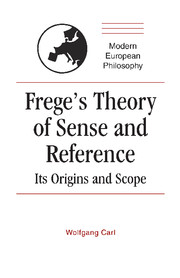Book contents
- Frontmatter
- Contents
- Preface
- Introduction
- 1 Frege's logic
- 2 The separation of the psychological from the logical
- 3 To break the power of words over the human mind
- 4 The thought
- 5 The reference of sentences
- 6 Judgement and knowledge
- 7 The reference and sense of names
- 8 Frege's contributions to epistemology
- Bibliography
- Index
1 - Frege's logic
Published online by Cambridge University Press: 05 June 2012
- Frontmatter
- Contents
- Preface
- Introduction
- 1 Frege's logic
- 2 The separation of the psychological from the logical
- 3 To break the power of words over the human mind
- 4 The thought
- 5 The reference of sentences
- 6 Judgement and knowledge
- 7 The reference and sense of names
- 8 Frege's contributions to epistemology
- Bibliography
- Index
Summary
The influence of Frege on twentieth-century philosophy is remarkable and is not restricted to the philosophical study of the scientific discipline he was mainly concerned with, namely, mathematics. If we want to understand this influence, we have to realise that Frege connected his work in mathematics with his interests in philosophical problems and that he pursued these interests for their own sake.
That Frege was a mathematician with well-defined philosophical interests is obvious from the prefaces to his books. In Conceptual Notation he starts by distinguishing between two ways of looking at knowledge: First of all, one can study the context of discovery of a specific form of knowledge, and then one can look at its justification. He next proceeds to divide all kinds of knowledge in terms of their specific forms of justification in order to determine the proper place of each form of knowledge that is exclusively based on logical laws. Finally, he explains his idea of a “conceptual notation” as a “formula language of pure thought” and complains about the deficiencies of natural language. In The Foundations of Arithmetic he insists on the universal validity of the laws of thought and on the distinction between thinking and having representations in order to exclude any psychological considerations from logic and from the realm of justification of knowledge in general. In the preface, Frege mentions three “principles” that constituted, as we shall see, the kernel of his philosophy in those days.
Information
- Type
- Chapter
- Information
- Frege's Theory of Sense and ReferenceIts Origin and Scope, pp. 5 - 25Publisher: Cambridge University PressPrint publication year: 1994
